Revenue River is now an Instrumental Group Company. Learn more.
call us: 303-945-4341
Revenue River is now an Instrumental Group Company. Learn more.

Corestream has a revolutionary platform that is designed to remove barriers and streamline voluntary benefits administration.
Corestream has been working with Revenue River since 2018, launching extensive email campaigns with the goal to get client employees to enroll in voluntary benefits during their annual open enrollment period.
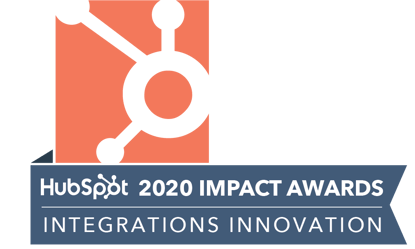
The prep for an open enrollment campaign is extensive, requiring months of lead time with a lot of moving parts and teams involved to launch for over 20 clients at once.
A typical open enrollment campaign involves a series of at least 6 emails that are sent out before and during the enrollment period, all of which are customized to look like they came from the client with specific branding, benefit offerings, and enrollment instructions.
There are a lot of variables and critical pieces of information that affect how we build an open enrollment campaign:
All of these critical pieces of information were previously tracked in a Google spreadsheet, so as soon as the Corestream account manager received this information (which was stored separately in Salesforce) they would communicate it to the marketing team who would then update the spreadsheet for our team to reference when building out the campaigns.
The whole process was extremely manual, time-consuming, and left a lot of room for error - especially when critical pieces of information were constantly being updated.
Staging the emails and landing pages themselves took weeks. Everything within the templates needed to be swapped out, updated, and customized per client and the spreadsheet needed to be cross-referenced at all times to ensure everything was correct.
If something got messed up, Corestream could lose a client and lose the chance to run open enrollment campaigns the following year, costing hundreds of thousands in revenue from benefit providers.
With so much at stake for Corestream, a few major challenges needed to be addressed:
Our solution was to build a dynamic content generator that would automate open enrollment processes. To achieve this, we needed to integrate Corestream’s Salesforce and HubSpot instances.
We configured the Salesforce integration to collect all of the necessary pieces of client information from the account manager in Salesforce, which was then mapped into HubSpot and pinned to the client’s company record in real-time. This eliminated the use of the extremely disorganized, confusing, and outdated Google sheet and overcame the challenge of delayed access to critical pieces of information. It also created the sense of a centralized system for all teams to operate out of.
As for overcoming the extremely time consuming and manual campaign build processes, the Salesforce Integration was also the component that allowed us to automate processes and get extremely creative in HubSpot.
First, we configured a custom functionality in the Salesforce integration that would send product objects over to HubSpot as timeline events, which we could then reference in smart lists and workflows.
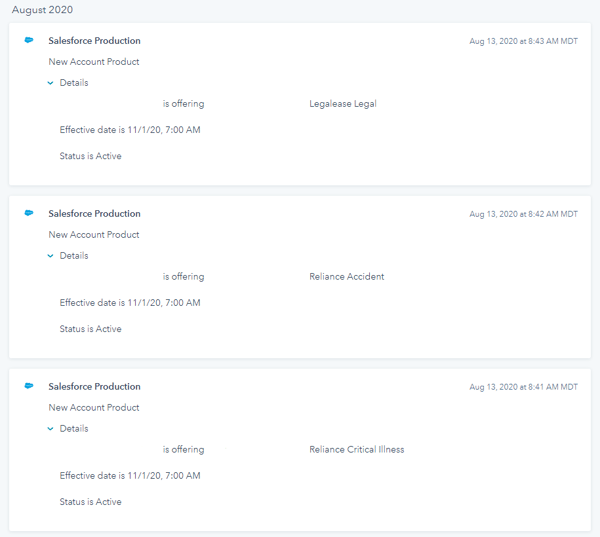
We used these product objects to tell us what benefits and providers were available to that client for the year, and then we used this information to set corresponding fields for the client that updated the standard verbiage we use to describe those products for open enrollment every year in all emails and landing pages. These fields were then able to be used as personalization tokens in emails to fill in the body content, and if the client had changes to verbiage we could make updates on the property-level on the company record instead of going into all 6 emails and landing pages and updating them individually.
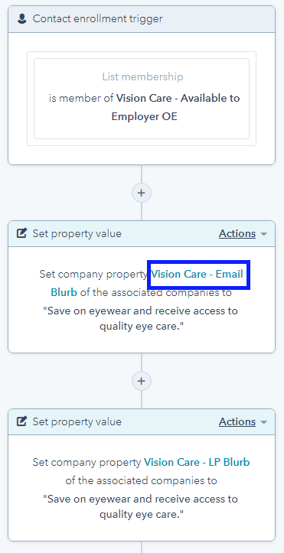
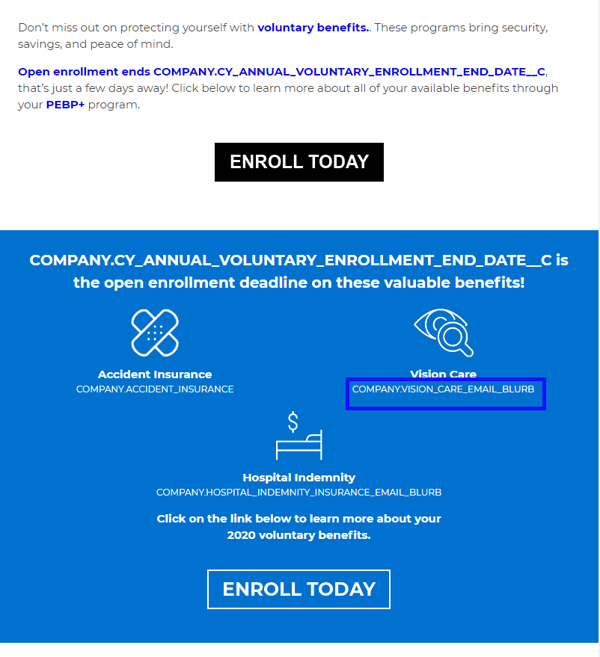
Using the information sent over from Salesforce, like a company’s primary and secondary hex code, we developed custom email templates that utilized personalization tokens in the HTML to automatically update colors and logos in the templates for each client. This allowed us to use one primary email template that could be cloned out for different client campaigns but didn’t require us to manually change all styling in the templates.
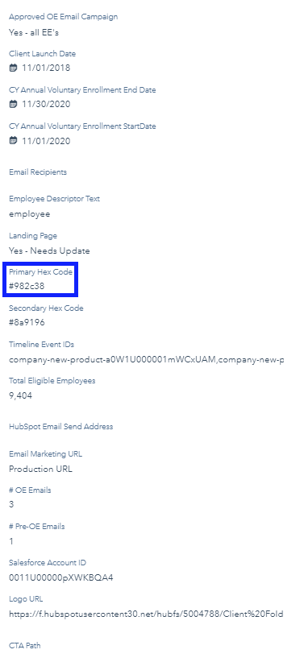

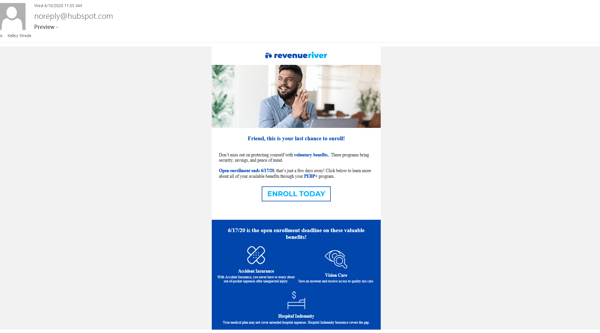
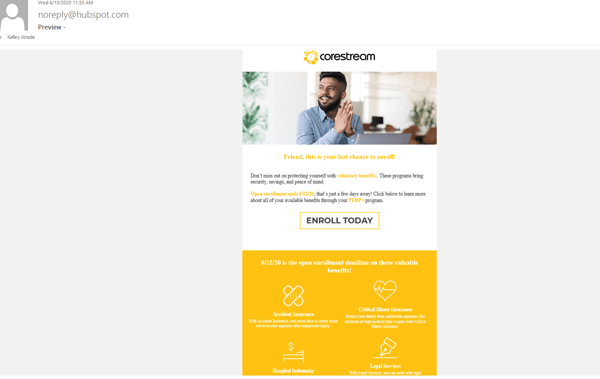
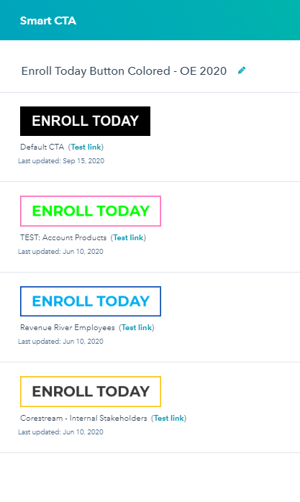
We were then able to utilize HubSpot’s smart content functionality to take other pieces of information from Salesforce, like the client’s enrollment URL, and automate the CTA link that is shown based on a client’s company list.
Finally, we needed to bring one more integration with Zapier into the mix. We realized HubSpot limits 10,000 contacts that can be associated to a single company, but some of Corestream’s clients have more than 10,000 employees that need to receive open enrollment emails. It is critical that contacts are associated with the company record in HubSpot so they can see all of the proper smart rules, branding, and personalization tokens. So, we created child companies and used Zapier to update all of the corresponding fields on the child companies to match the parent company as well.
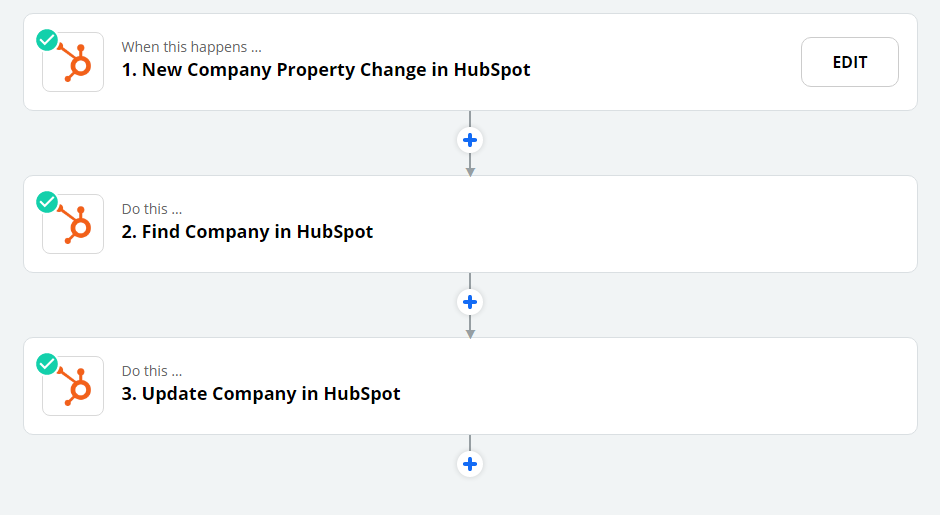
With our dynamic content generator via integration, we were able to streamline processes, increase visibility, and reduce the average open enrollment campaign build by 50%.
We’re on track to run 80% more campaigns this year with extra bandwidth from the solution and are projected to increase revenue from Corestream’s target accounts by $1M due to the larger volume of campaigns we’re able to run.

Next, we'll be looking to use the integration to target employees year-round to boost evergreen product enrollment, driving even more revenue for Corestream.